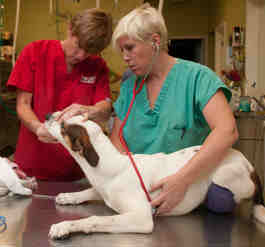Member Spotlight: Dr. Lori Pasternak Dr. Lori Pasternak (right) examines a dog at Helping Hands. Kathy Milani/The HSUS Young chefs just starting out don’t make much money, and when Nathan Stickel was faced with a $4,000 bill to patch up his young cat who’d tussled with a dog, he feared his only option would be putting Maggie to sleep. “I didn’t ... have $4,000 to my name,” says the Richmond, Va., resident. “They wanted me to pay it all up front. I said, ‘I can’t do that.’” Then Stickel heard about Dr. Lori Pasternak, a Richmond veterinarian whose surgery- and dentistry-only clinic, Helping Hands, charges fixed rates that are a small fraction of standard fees. The cost of sewing up Maggie’s torn skin would come to only a few hundred dollars, but even that amount was difficult for Stickel after covering a few nights of care for Maggie at the emergency hospital and his regular vet. So Pasternak made him an offer he couldn’t refuse: If he agreed to volunteer for 20 hours at a local animal welfare organization, the total would be cut in half. Stickel was ecstatic. Maggie came out as good as new, and the chef happily spent 20 hours cleaning kennels and socializing dogs at the Richmond Animal Care and Control Shelter. The money to subsidize Maggie’s operation came from the clinic’s “good citizenship” fund. Five dollars from each procedure performed is deposited into the account; if a client can’t afford the clinic’s bare-bones fee for a lifesaving surgery, the fund is tapped to pay for it. “For every $10 we give them, they owe an hour of community service to either us or any animal rescue organization where they live,” says Pasternak. Her motivation for creating the clinic was originally a selfish one, Pasternak says. Her talent and interest lay in surgery—not in “dealing with finances and trying to be a salesperson”—and she preferred a position that would enable her to do only that. While helping out at a local low-cost spay/neuter clinic, it dawned on her that nothing similar existed for more advanced surgeries. “A light bulb went off that I could have a job where I could do just surgeries and do it like a low-cost spay/neuter clinic,” she says. Pasternak keeps costs down by eliminating office visits and consultations and relying on clients’ full-service veterinarians to provide pre- and post-op care. There are only four paid staff members; volunteers help clean, do laundry, and monitor animals as they awake from anesthesia, freeing the staff to focus on procedures. With their donations of money and time, community members have embraced the clinic “beyond my wildest dreams,” Pasternak says. For “probably 85 percent of the volunteers ... we’ve never touched their pets. They come because they ... believe in what we do and they just want to be part of it.” The clinic’s unique model has also garnered attention from local news media, National Public radio, and Good Morning America. And the recognition from HSVMA as their 2010 Direct Practitioner of the Year “really confirmed my belief in what I’m doing,” she says. “... I continue to do what I do because I love it so much, but to be recognized for it is just absolutely humbling and amazing.” This article originally appeared in the September/October 2011 issue of All Animals magazine. |
